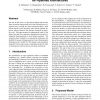Free Online Productivity Tools
i2Speak
i2Symbol
i2OCR
iTex2Img
iWeb2Print
iWeb2Shot
i2Type
iPdf2Split
iPdf2Merge
i2Bopomofo
i2Arabic
i2Style
i2Image
i2PDF
iLatex2Rtf
Sci2ools
106
click to vote
ICCAD
2001
IEEE
2001
IEEE
An Assembly-Level Execution-Time Model for Pipelined Architectures
The aim of this work is to provide an elegant and accurate static execution timing model for 32-bit microprocessor instruction sets, covering also inter–instruction effects. Such effects depend on the processor state and the pipeline behavior, and are related to the dynamic execution of assembly code. The paper proposes a mathematical model of the delays deriving from instruction dependencies and gives a statistical characterization of such timing overheads. The model has been validated on a commercial architecture, the Intel486, by means of timing analysis of a set of benchmarks, obtaining an error within 5%. This model can be seamlessly integrated with a static energy consumption model in order to obtain precise software power and energy estimations.
Related Content
| Added | 17 Mar 2010 |
| Updated | 17 Mar 2010 |
| Type | Conference |
| Year | 2001 |
| Where | ICCAD |
| Authors | Giovanni Beltrame, Carlo Brandolese, William Fornaciari, Fabio Salice, Donatella Sciuto, Vito Trianni |
Comments (0)

